“Lord, I Am Just One”

[The essence of this message was shared with Emmaus Lutheran Church of Bloomington, Minnesota, on November 13, 2005.]

A Little Background.
Do you remember last year? Four major hurricanes hit Florida. One hit Alabama. It was Hurricane Ivan. Our home and the community of Silverhill were under mandatory evacuation. Freeway 65, just like 35W out here by Emmaus, was reversed and all lanes went north for 150 miles. We were going to stay in our home until I turned on the TV at 3:30 in the morning to get a hurricane update. Hurricane Ivan was aiming right at us. Category 3 or 4! They were evacuating Thomas Hospital, a three-story brick building 20 miles away from us that was very substantial. I knew we had to get out of there if THAT hospital was evacuating. So Cindi and I are in the car at 3:45 heading north and not knowing where to go. We ended up in Columbus MS and we were there for two days in a motel chocked full of hurricane refugees.
Hurricane Katrina was exactly like that for lots of people in Louisiana, Mississippi, and Alabama just west of Silverhill.

What we found when we got home from Ivan a year ago through downed power lines and trees all over the roads was a house that was okay, but trees were down or severely damaged around us. In Silverhill the trees up and down the boulevards used to look like this street out by Emmaus up the block here before that tornado went through a few years back. Houses were damaged, roofs and pieces of roofs missing. The streets of Silverhill were lined with oak trees planted in 1915, carted in by horse and wagon 20 miles from Marlow AL. It took months before they were cleared in Silverhill and there is clearing going on in various parts of Baldwin County still today. Remember, Hurricane Ivan was in August of 2004. The story of Katrina is similar but worse for much of the Gulf Coast to our west.

Hurricanes Last a Day But Hurricane Effects Last Years.
Hurricanes are on the news for a day, but their effects last years. Even today a year after Ivan, if you fly into Pensacola, which is about 30 to 40 miles from us, you can still see blue rooftops. Those roofs are still covered with blue tarps from FEMA--there is so much damage there, they still have not caught up with the roofing needs! A friend of the congregation lives there. He is an older fellow--he has had his daughter and son-in-law and their children living with him in his little house since Ivan. Remember, it is going into the 14th month after the fact.

Insurance Coverage Problems after Hurricanes.
But we live in Silverhill. It turns out that Hurricane Ivan went right over our house and right over our church. There was so much damage in our area that some insurance companies are no longer operating in our area. Insurance carriers have dumped a lot of policies—their risk is too high. We are hearing problems with insurance in Katrina’s path now. In our case after Ivan, our insurance agent has been told that he can write no new policy, unless another is cancelled!

Hurricane Needs Still There a Year after the Fact.
In August of 2005 I get an urgent letter from a South Baldwin community agency that talks about how we need so many volunteers to help people get roofs and trees and walls and you-name-it taken care of. Remember, that is 12 months or so after Ivan and just before Katrina. That agency has not got a prayer for its goals given Katrina.
Let us pick up what Cindi and I are doing a week ago. Cindi and I are driving back from a walk on the beach in Gulf Shores on Saturday. Much of Gulf Shores—it is a city named “Gulf Shores”-- is wrecked along the shore except where they are building the expensive condos--figure 600,000 to 1.5 million dollars a piece. Work started on those immediately after the hurricane--there is money driving that system. A couple blocks away, there are wrecked homes still--there is little money driving renovation there. When you have been busted by a hurricane physically and financially, you do not just start up where you left off.
So Cindi and I are driving back to Silverhill a week ago. She has heard a poignant Hurricane Ivan story. There’s a family in Central or South Baldwin County--remember, it’s 14 months after Ivan--with a physically-impaired husband and two children in a mobile home without a stove! Appliances were all flooded along with everything they had in that home in Hurricane Ivan. They just now got far enough along so that they finally got their kitchen stove replaced. No stove--14 months with kids! Hurricanes cause lots of problems, and part of it is poverty, because of insurance issues and other things. That is why our church is looking at mid-term relief for Katrina.

Katrina Worse than Ivan.
Let us focus on Katrina. Katrina is much worse than Ivan in terms of destruction. Destruction was major with Ivan, the storm that we knew upfront and personal, but it is worse by a factor of maybe ten when it comes to Katrina. Ivan is off the screen for most people. Katrina is already fading. So is Rita. There are many people who are still suffering from Ivan’s effects, and there are going to be many, many more stoves and other items to replace with Katrina!

Katrina Summary in Nutshell.
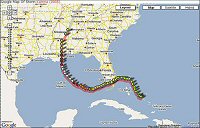
Here is a nutshell summary. Do not forget New Orleans, but forget about New Orleans in terms of hurricane damage. Bad and corrupt government lost much of New Orleans to flooding--that is not hurricane. New Orleans did not even get a direct hit. Hurricane Katrina came ashore east of New Orleans and remained a hurricane for over ten hours as it proceeded north. Hurricanes are not that little funny circle with wings you see on your TV. They cover territory. In terms of Katrina--you had a major, major storm. You had hurricane winds out to a couple hundred miles. Think like a Minnesotan here. Katrina at its worse would have stretched from Watertown, South Dakota, through Minneapolis, almost to Green Bay, Wisconsin, if the eye of Katrina were over Emmaus Lutheran Church. And most of the damage would be here at Emmaus and toward the Green Bay side of the storm.
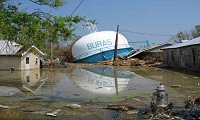
Silverhill was 120 miles from the eye-wall of Katrina and 20 to 30 miles from the Gulf. We had hurricane winds for 18 hours. The 60 foot magnolias in my back yard looked like carpenters’ squares with the bend coming about 10 to 15 feet up. Many trees were obviously busted off, but flexible things like magnolias come back to more or less straight after a few months. Lots of wind where we were, but damage was west of us, just 30 miles. Where Katrina came ashore shrimp boats were moved inland, structures were toppled or totally washed away. Think of the worse picture you saw of Pascagoula or Gulf Port. It was like that all the way from the Louisiana-Mississippi line to Mobile Bay. We are just a few miles from the Bay. We were spared another hit, but we had probably Category 1 and 2 winds where we were. Katrina was a hurricane for ten hours as it moved north up Mississippi.

Not an Issue of Sin.
Some preachers point to New Orleans and say something like, “That’s such a sin-city. God did a number on it. They were actually celebrating a gay something-or-other when Katrina hit.” Some have looked at the Mississippi coast and said similar things like, “When you have all that gambling and drinking going on there, don’t you expect some consequences from God?” There were lots of gambling-related jobs lost in Mississippi, but there were between 400,000 and 500,000 jobs lost in the Katrina-devastated area. It will be some time before we know how many real jobs have been lost just in individual towns!
What a mess! Do you think God’s Word might have something to say about Ivan and Katrina and Rita and all those other names now forgotten? Are there any principles for the people of God in dealing with disasters?
God’s Word has a few principles that are important to look at in times like these. Let us take a look by asking about readiness.

I. God desires that we would be prepared for coming disaster.
Many of our problems in life are caused by our own behavior.
The root cause is sin.
You and I are called to intercede for our communities.
Jesus, our propitiation, is the ultimate answer to sin.
Only Jesus Christ can really deal with sin.
[Here is God speaking:] Ezekiel 22:29-31 “The people of the land have used oppressions, committed robbery, and mistreated the poor and needy; and they wrongfully oppress the stranger. So I sought for a man among them who would make a wall, and stand in the gap before Me on behalf of the land, that I should not destroy it. ...”
Point. God calls on us to intercede, to be prepared, to wage war with sin. Only Jesus can succeed against sin, however.
Here’s what was happening in Silverhill before Katrina: People were praying that the hurricane would blow itself out, would go somewhere else, would spare loved ones. Many people were standing in the gap for the people of the land--the good ones and the bad ones!
Suppose we do not get the answer from God that we desire. We know He is a good God who loves mankind with a love that sent Jesus Christ to the cross on our behalf. Where does that leave us in a hurricane, if Jesus is the answer? That gets us to our second Biblical Point.

II. A disaster is not always for specific people.
All people are sinful--“There is no one righteous, no not one!”
Disaster will come indiscriminately--we are all in the same mix.
The outcome in life is death--no exceptions.
We perish if we do not turn from sin in our lives.
[Jesus tells us clearly that all disaster is not aimed at specific people. We have all sinned and all deserve God’s judgment. But God is merciful. Listen to this:] Luke 13: 1-4 There were present at that season some who told Him about the Galileans whose blood Pilate had mingled with their sacrifices. [And Pilate was no hurricane!] And Jesus answered and said to them, “Do you suppose that these Galileans were worse sinners than all other Galileans, because they suffered such things? I tell you, no; but unless you repent you will all likewise perish. Or those eighteen on whom the tower in Siloam fell and killed them, do you think that they were worse sinners than all other men who dwelt in Jerusalem?”
Point. Disaster is not necessarily aimed at specific people. We have all deserved hurricanes or tornadoes of whatever. God in His mercy has spared us, but we deserve something else.
When a hurricane passes, whether it is a hit or not, people rejoice that they have life and even broken limb. That was us in Silverhill. But people were numb. The South is interconnected along the Gulf Coast. All electricity was out. Cell phones work off electricity and towers. Towers were down and electricity could not power those towers. Nobody knew about loved ones. Many times they still do not know. One of our snowbirds, Bob Fuchs, was down in Silverhill last week, trying to find out about his relatives in Biloxi, MS! If that is not numbing, think about how people were feeling when they started to find out what was left. All the TV could do was talk about New Orleans, but the damage was between us and New Orleans--the TV coverage did not even get into the damaged area for almost a week.
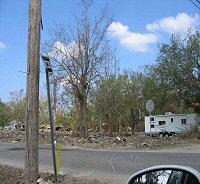
Talk about disconnected! Hurricane Katrina August 29. Zion Lutheran Church was still doing its usual activities through the end of the week. Our initial contacts by August 31 were revealing minimal damage in our contacts in Mobile and Gulf Shores. We had no way of hearing from anybody else. Friday morning I get a call from an Illinois church on the road into Mississippi with a van and trailer load full of water and candy bars. They felt the Lord wanted them in Hattiesburg, but there were no contacts there. They ended calling us because we were AFLC and next to Mississippi. I end up talking to our Mayor who was from Mississippi who had a contact with a company in Hattiesburg and I got a cell phone number. Remember, landlines are out and cell phones are spotty at this time. Wrong number when I call, but I did get through. I got a road report from the wrong number and a shelter number that was up and working. I talked to the van and got them connected. I told them to call me back if their phone line could not get through--we seemed to connect better with the communication grid where we were in Alabama.
The realization was beginning to hit. There are major problems to our west. We still did not know how bad it was. And oh yes, the mayor warned me for the congregation--Jefferson County had released all its convicts before the storm. Nobody knew it and the mix of people as refugees was bad. Major concerns about crime were emerging.
Do you get the picture? When you are in the middle of this kind of thing, how are we to look at natural disasters? What might the Bible have to say about this?

III. Problems are not for each of us, but for all of us.
Burdens are not without purpose.
God does lay burdens of others on us.
We have no success unless we bring those problems to God.
God will provide the resources needed.
[Think of Moses. Talk about burdens. Listen to Moses complaining to our Heavenly Father:] Num. 11:11-17 ... "Why have You afflicted Your servant? And why have I not found favor in Your sight, that You have laid the burden of all these people on me? Did I conceive all these people? Did I beget them, that You should say to me, ‘Carry them in your bosom, as a guardian carries a nursing child,’ to the land which You swore to their fathers? I am not able to bear all these people alone, because the burden is too heavy for me. ...”
[Here is God’s response:] So the LORD said to Moses: "Gather to Me seventy men of the elders of Israel, whom you know to be the elders of the people and officers over them; bring them to the tabernacle of meeting, that they may stand there with you. Then I will come down and talk with you there. I will take of the Spirit that is upon you and will put the same upon them; and they shall bear the burden of the people with you, that you may not bear it yourself alone.
Point. Many problems in life are too big for us. Did you catch what God does for us with big problems? Our Heavenly Father provides others to come along side and help bear the load. Jesus Christ Himself tells us that He is our yoke fellow. He makes the burden do-able.
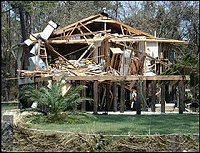
It had become apparent after a half week or so that we had big problems. The population of our county swelled. We were the first county on the east side of Katrina that had a functional infrastructure. Shelters were going up and relief relay systems were developing. We were getting inquiries. We put a link on our church website trying to connect people with the AFLC’s focus, World Relief. People and churches were calling us, asking for a more direct mechanism for giving. We relayed them to the Red Cross and World Relief.
I had a church member dying in a local hospital. Now going to visit just a couple days after this Katrina thing, there is security all over the place. Remember convicts? How about hundreds of shady characters from sin city over there in New Orleans as well? Drug concerns and theft concerns. You can imagine. We offered our church facility to the Red Cross. We connected with Loxley Church of God and the Foley Red Cross Shelter. We began fund-raising locally.
We were scrambling to get connected. Pastor Rife at Loxley--contact into Mississippi--needs still not recognized fully. Red Cross Shelter--staffing for food. Thrivent--local matching-funds. Loose networking with other churches in area--list needs. Connect churches and individuals with needs we know. Denominational lines within the body of Christ were blurring.
Silverhill Zion Lutheran Church had gone from being oblivious to Katrina consequences to being involved on a congregational and individual member level. Where do you go and how do we start with these big kinds of burdens? Would you believe that God has given us His Word on that as well?

IV. Do good, but start with God’s people.
Jesus Christ Himself calls on us to love one another.
Jesus Christ provides what we each need.
Jesus Christ provides beyond what we need for others.
Jesus Christ grows a good crop in us by providing problems for us.
[St. Paul lays out this doing good business in Galatians:] Gal 6:2-10 Bear one another's burdens, and so fulfill the law of Christ. For if anyone thinks himself to be something, when he is nothing, he deceives himself. But let each one examine his own work, and then he will have rejoicing in himself alone, and not in another. For each one shall bear his own load. Let him who is taught the word share in all good things with him who teaches. Do not be deceived, God is not mocked; for whatever a man sows, that he will also reap. ... And let us not grow weary while doing good, for in due season we shall reap if we do not lose heart. Therefore, as we have opportunity, let us do good to all, especially to those who are of the household of faith.
Point. John 3:16 tells us about God’s love--He loved the whole world, not just believers. “God did good” for the world by sending His Son Jesus. The issue for us is, how can we be like our Father? Is not part of it by doing good? And that doing starts with the fellowship of believers but it extends to all others.
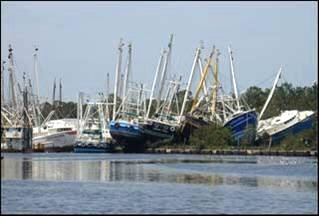
Charlie Canning and I were working at the Foley Red Cross Shelter. The numbers were shrinking from day to day. It was breakfast. A couple of volunteers from FEMA came over to the shelter and asked for a cup of coffee. The Red Cross coordinator about lost it. The person who poured the coffee for those two FEMA volunteers was lambasted. “Don’t give them anything!” was the shout. Federal rules prevent charities from helping FEMA--a hurricane volunteer was denied a cup of coffee how many times during this catastrophe? On top of that, the Shelter was closing. We had gotten to know the coordinator and a friendly transfer of goods from one volunteer organization to another took place: We loaded two or three pick-up truck loads of paper products and instant meals on to Charlie’s truck, took it up to Loxley Church of God, and that stuff was in a Mississippi shelter 60 miles away that afternoon feeding people and caring for them. Think about these volunteers. We could not get gas during this time--people were driving on gas that they were not sure could be replaced.
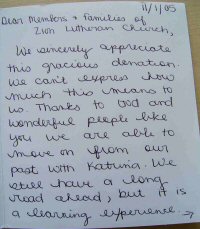
Now remember, we are about a week into the after-Katrina time. We began to see a shift in relief focus. Refugees were heading home even though there oftentimes was nothing there--FEMA was providing some tents and thinking about trailers. The time of mass mobilization help was obviously coming to a close. Our Zion Lutheran Church Council met and talked about things. We were too little to help with big projects and we were an elderly congregation. We decided to apply Galatians 6:9-10. We polled our congregation to identify specific households that we as a congregation knew, and to help them. Many individuals and churches had asked us to help them help--we began channeling funds to five households, to two churches that we were aware of in the devastated area, and to the Sheriff’s Ranch which had an influx of 20 youngsters from Mississippi and no funds to support their needs. Yes, and we helped our local nursing home--same thing--doesn’t our Heavenly Father call on us to help local people help this kind of influx of refugees?
Our congregation made a concentrated effort to fund our local task fully. We looked to doing intermediate relief--6 months worth of minimal funding of households and related support. You folks in Emmaus along with seven other congregations and who knows how many individuals in them have helped Zion along with another two dozen individuals who have sent us funds directly. And let us not forget a Girl Scout in North Dakota responsible for sending lots of boxes of Bibles and school supplies that we got to Pascagoula.

Finally, the Big Idea.
So, what is the bottom line?
Isn’t it standing in the gap?
That has to be the central point for God’s people. The people of God stand in the gap for themselves, yes. But do you see how we Christians have the calling to stand in the gap for our communities and our nation itself?
Zion Lutheran Church thanks you folks at Emmaus for your partnership and help in Hurricane Katrina Relief. We know that you and I have been called by the Gospel to be God’s very own people. “Peculiar”--do you remember that quote. “A peculiar people!” Here’s how peculiar we are. We can will to do good, but sometimes we can just be called to do the hard things because it will build us up in our spiritual walk. Paul says:
1Cor 9:17 For if I do this willingly, I have a reward; but if against my will, I have been entrusted with a stewardship. [Doesn’t hurricane relief fit that bill?]
2 Cor 9:7-8 So let each one give as he purposes in his heart, not grudgingly or of necessity; for God loves a cheerful giver. And God is able to make all grace abound toward you, that you, always having all sufficiency in all things, may have an abundance for every good work.
Let’s pray together: Lord Jesus, You call us out from the world, but You call us to be in the world. Our world is sometimes such a mess. We get in over our heads in financial concerns. We come up short so often it seems. But we look to Your provision in hardship and at the lessons You teach us when You set us up to stand in the gap for others. We do not understand how You can bring blessing from relatively little focused on the lives of others, but we thank You for encouraging us in knowing that You do provide what is needful for others and for us in our giving. Bless this congregation of Emmaus along with other churches and other people who have been called to minister to the Katrina Gulf disaster area. Bless their hearts with assurance that You know their needs even as You know the needs of so many people in the Deep South. Amen.






|